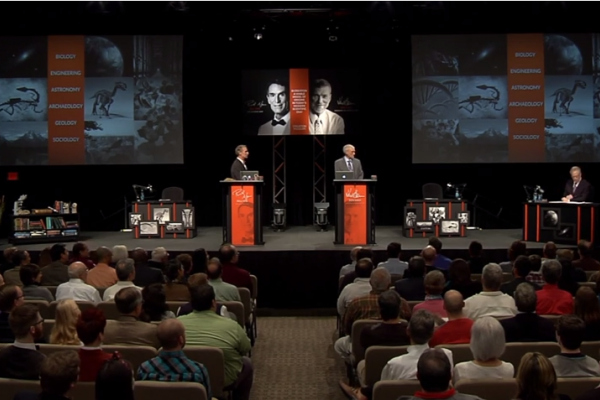There was a moment during last week’s “debate” between Bill Nye the Science Guy and young-earth creationist Ken Ham that I think was more telling than any other.
During the Q&A session, Ham was asked what seemed to me to be a very simple question: “Hypothetically, if evidence existed that caused you to admit that the universe is older than 10,000 years and creation did not occur in six days, would you still believe in God, and the historical Jesus of Nazareth, and that Jesus was the son of God?”
What was most telling was not really what Ham said, as much as what he didn’t say, which was “Yes.”
In my mind, this question was a softball pitch. It couldn’t possibly be easier. And Ham was given two minutes to answer the thing? His response should have taken all of two seconds: “Yes.”
Instead, Ham used the lion’s share of his rather generous allotment, trying to explain, again, why he believes the universe was created more recently than the invention of beer by the Mesopotamians, and how it’s impossible to use science to analyze the evidence of the distant past (because, well … because it just is).
But that’s not what the moderator, Tom Foreman, asked. He didn’t ask if Ham believes the universe is young. By that point, no one in the audience could have been unaware of how old Ham thinks the universe is. The question was, if you were to — hypothetically — set those beliefs aside for just a moment, would you still be a Christian?
As a Christian — an apologist, no less — Ham’s answer should have been a single word, offered definitively and without hesitation. Answering, “Yes,” would not have meant Ham was abandoning his belief in a young earth; it simply would have meant that his Christian faith is not based in that belief.
The fact that he, apparently, could not answer, “Yes,” to such a straightforward question seems to say a lot about what his faith is based in.
On the one hand, if someone like Ken Ham wants something that is so plainly contradicted by the scientific evidence to be the basis for his faith, that’s fine. He’s a grown man, and he’s entitled to believe in things that are demonstrably false if he really wants to.
But on the other hand, when he was sitting on that stage, he presented himself — and I’m sure, was perceived by most viewers — as a representative of Christianity. And, as a Christian myself, I can’t help but be bothered seeing Ham teach people that young-earthism and a literal view of Genesis are foundational to Christianity, since, you know, those are both things that the Bible never once describes as foundational to Christianity.
Ham said something else that night that he’s fond of saying: that his calling is to teach that “the history” (based on his literal interpretation of Genesis 1-11) “is true; that’s why the gospel based on that history is true.”
This is just another instance where Ham’s views run far afield from what the Bible actually says. Scripture is painfully clear on this. We don’t need to find pieces of Noah’s ark to know the gospel is true; we know the gospel is true because Jesus (remember him, Mr. Ham?) is risen and he lives in us.
The problem with both of these positions is that they tell the world that all it takes to invalidate the entire Christian faith is to show that the universe is more than 10,000 years old.
I, for one, think the gospel is a very important message, and I think Ham’s beliefs about evolution and the age of the earth are utter nonsense. I don’t think the two should be bound together at the hip, and I daresay most Christians would agree.
So, let’s disentangle them, shall we? Let Ken Ham have his young-earthism, and let him go down with it to the footnotes of history after it has gone the way of the flat earth and geocentrism.
Only, for the love of God, don’t let him drag the gospel down with him.
Tyler Francke is a print journalist and freelance writer in the Pacific Northwest. He is the founder and lead contributor of God of Evolution — a blog promoting the harmony of biblical Christianity and mainstream science — and author of Reoriented, a novel due to be released in 2014 by TouchPoint Press.
Got something to say about what you're reading? We value your feedback!
